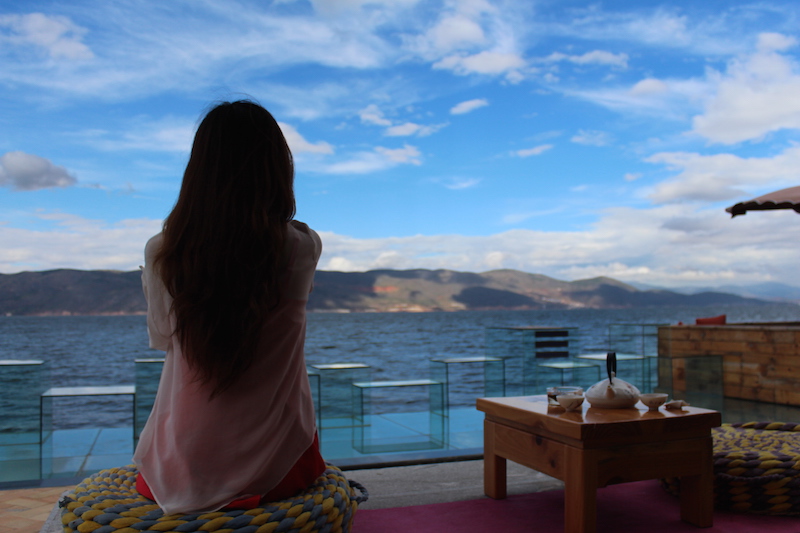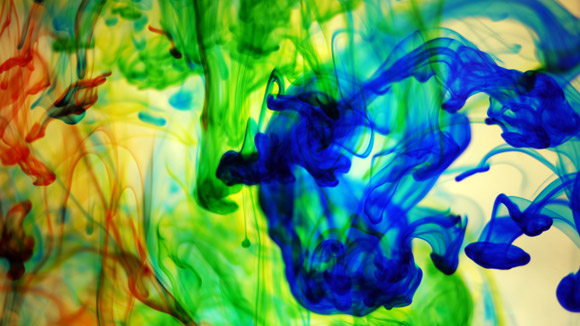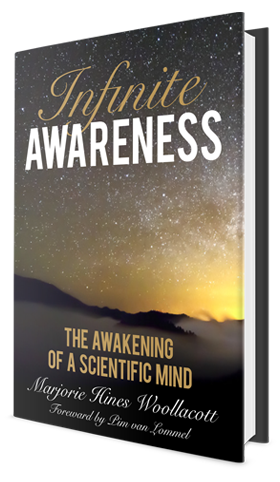A Scientist Steps Beyond the Material World
Is it possible that there is a scientific basis for the mystical experiences people, including myself, often have in meditation? This is one of the key questions I address in my forthcoming book, Infinite Awareness: The Awakening of a Scientific Mind. The answer that most scientists would give is a resounding no, but in my book I take the reader with me through my own exploration of science and meditation.
My Early Years
Through my early years as a meditator, I was, first and foremost, a scientist. As a scientist, I had no interest in finding research support for phenomena that are considered mystical or paranormal. Such experiences are not within the scope of Newtonian science, and this precise, cause-and-effect, material view was the perspective I held. So, if someone mentioned a topic like energy healing or near-death experience or—God forbid!—reincarnation, I would raise a cool, skeptical eyebrow and say nothing.
At the same time, I was having my own experiences in meditation, and these experiences were inexplicable under Newtonian science—my scientific worldview! I dealt with this by compartmentalizing the meditator side of my personality. In other words, I didn’t speak about those experiences with my friends in science.
This led to a fragmented life. I would reveal one type of experience to my friends who meditated and in the classes I taught on yoga and meditation. And I would bring up other, very different experiences of mine, with my colleagues in neuroscience—those with whom, say, I did research in various areas of physical rehabilitation—and with the rest of the world. This dichotomy drove my husband crazy. He loves meditation and complementary medicine, and at social gatherings with my scientific friends, he would start to talk about Reiki or Tai Chi or hypnosis therapy—only to get a kick under the table or a horrified look from me as I quickly “helped” him by changing the subject.
After twenty-five years of leading two lives, I felt a bit schizophrenic, a problem I decided to resolve by publicly integrating the two halves of my experience. One metaphor that comes to mind is that my life was like a block of marble I had been sculpting in two parts—neuroscientist on the left, meditator on the right—without concern for how they fit together. Now, I wanted to integrate these disparate but connected images by working consciously on both sides.
From the neuroscience side, I began to do research on meditation and its effects on the brain and on our behavior. I was curious, even driven, to see what carefully formulated scientific studies said about the effects of meditation on our mind.
From the meditative side, I began to look into the current scientific research on paranormal phenomena: near-death experiences, reincarnation, energy healing, and complementary medicine. What do scientists have to say about physical evidence that points to explanations that do not fit into the Newtonian model?
My Own Research
In the neuroscience arena, I did research with my own graduate students on the effects of meditation on our mind and behavior. I found, like many other labs, that meditation improves both our ability to focus our attention and to be flexible in that focus. Through meditation, the attentional networks in the brain become demonstrably stronger. As a measurable outcome, meditators are able to keep their focus on one task for longer periods than people who don’t meditate, and meditators are also more adroit at switching their focus quickly to attend to a new task.
This research shows that meditators are like athletes of the attentional arena—their attentional systems become both strong and flexible. I saw that I had noticed this in myself during my daily activities as a scientist. My mental clarity and focus improved with the years of meditation practice. This research began to help me integrate the two halves of my life, and create a stronger connection between science and my own experience of meditation.
The second part of my research, looking at other people’s experiences of meditation and at research on paranormal phenomena, was much more difficult for me. Why? I think my own scientific bias made it hard for me to have an open mind. I was amazed to find a great deal of research on the efficacy of complementary medicine (where part of the healing modality is energetic), near-death experiences (which occur when the brain is not functioning), and of cases suggestion of reincarnation (where a young child has conscious recollection of being in the life-experience of someone who has died). My own scientific biases against such topics was so strong that when I read the peer-reviewed articles in scientific journals, my first thoughts were, Can this be true? Do I dare report it? No scientist would believe it! So, this was the area of the most growth for me.
Reiki and Other Complementary Treatments
Over time, as I continued to read peer-reviewed papers, the cumulative effect of the evidence began to change my response regarding each of these areas of “unscientific” research. With energy healing, for example, after reading many carefully performed studies related to this field, I was convinced that such modalities as Reiki and Therapeutic Touch can bring about a measurable improvement of health and well-being. This is not to say that all the articles related to energy healing like Reiki and Therapeutic Touch show evidence that they work, but there are enough carefully executed studies showing positive effects, that I believe there is something there. To give an example, one recent review of Reiki studies examined 12 randomized, controlled trials conducted on a variety of health conditions, including anxiety, depression, and recovery from stroke (VanderVaart et al., 2009). The authors note that 9 of these 12 trials demonstrate positive results from the Reiki treatments.
As would be expected, these reviewers take the cautious stance that studies on Reiki treatment are still in an exploratory mode. They propose that many more carefully planned blinded, randomized, controlled studies be performed in order to extend these evaluations of Reiki’s efficacy in improving health. This is my feeling as well. As many more studies of the efficacy of energy healing are performed, we may find out that there are certain populations and also certain health conditions for which energy healing has the greatest impact.
As part of my teaching a class on complementary medicine to seniors at the University of Oregon in the last six years, I began to explore for myself the effects of different healing modalities, and as part of this exploration, I went to a Reiki master for a healing session. I was astounded at what this woman was able to tell me about myself and my own health and well-being. Going to this practitioner and later taking a three-day Reiki workshop awakened me to a new area of experience, one that I found to be profoundly moving.
I describe these events and my experiences of Reiki’s healing energy on myself and others in detail in my book Infinite Awareness: Awakening of a Scientific Mind, available on pre-order now.
Pre-order Infinite Awareness: Awakening of a Scientific Mind on Amazon today, follow me on Twitter at @WoollacottWrite and please like my new Facebook page!
- VanderVaart et al., “A Systematic Review of the Therapeutic Effects
of Reiki,” Journal of Alternative and Complementary Medicine 15, no. 11
(2009): 1157–69.